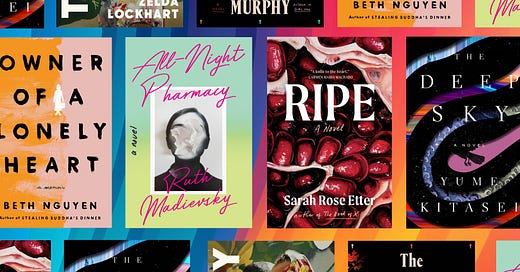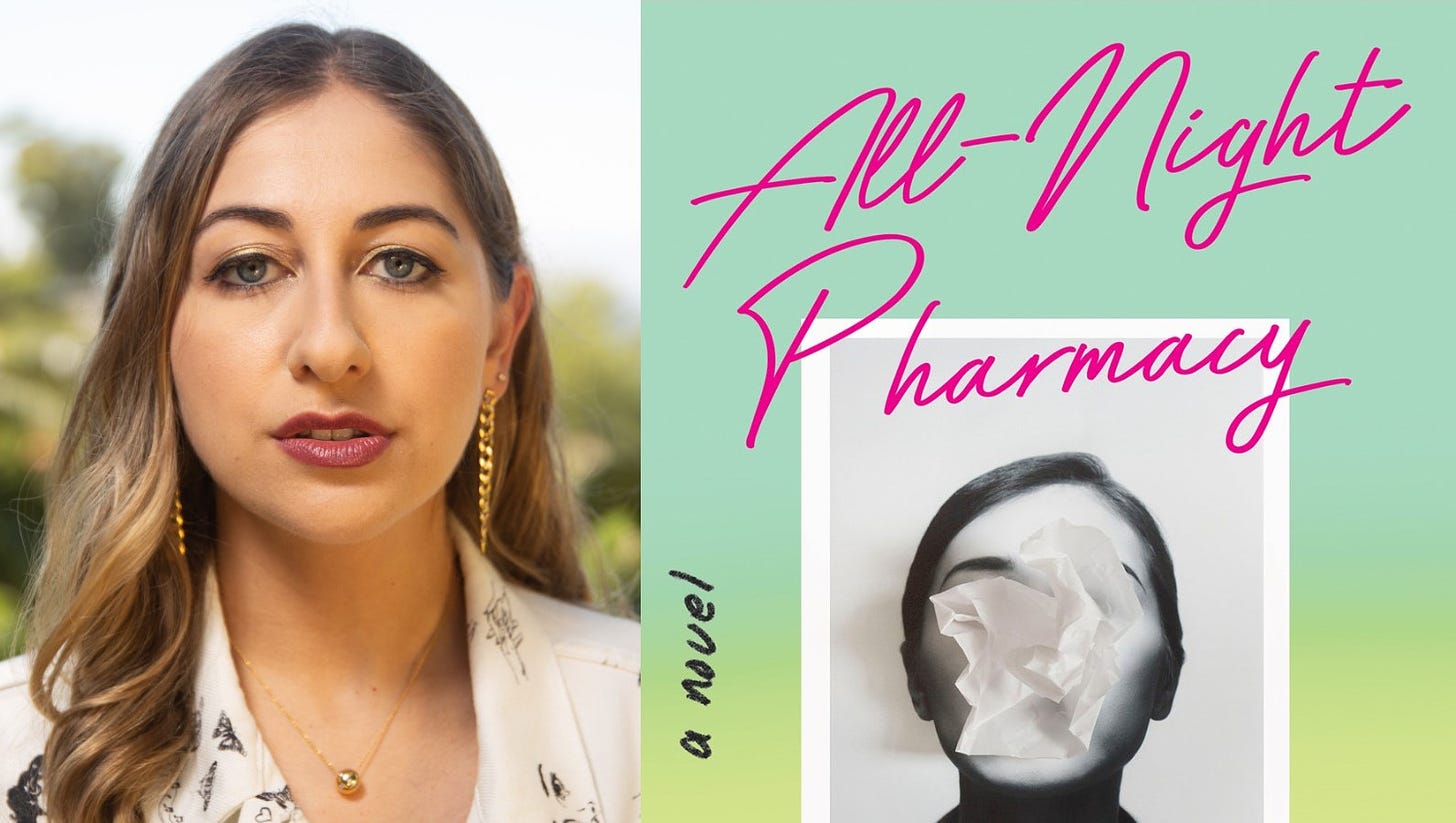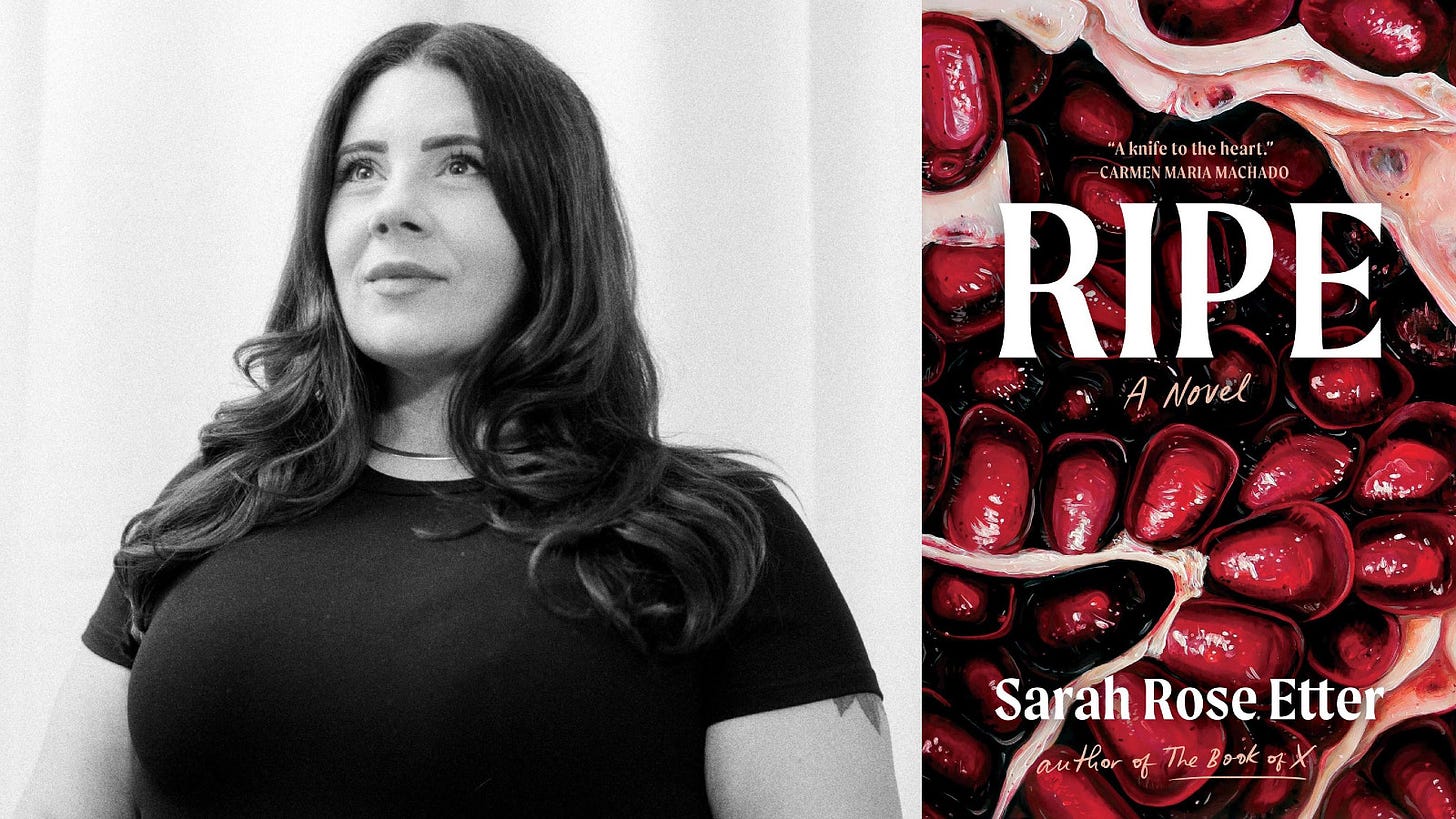July book preview: Black holes and missing sisters
Plus, exclusive conversations with Ruth Madievsky and Sarah Rose Etter.
Last week, another Esquire story went semi-viral on Twitter: Kate Dwyer’s “The Year of the Slim Volume,” which astutely identifies the increasing popularity of short novels like This Is How You Lose the Time War and the Storybooks line from New Directions.
I once tweeted that “most books are 25-50% too long,” but deleted it after a cascade of YA readers thought it was, among other things, “stupid,” “elitist,” and “a critic making fart noises.”
But it’s true. Most of my favorite novels are under 300 pages, some of them under 200, and even the tomes I love, like Bolaño’s 2666, would (gasp!) be even better if they were shorter. I’m hoping the publishing industry takes note of this year’s trend and removes the pressure on writers to pad manuscripts to meet abitrary word-count thresholds (not that all writers do this, but surely some do).
In this issue of The Frontlist, I spoke with the authors behind two of July’s most fascinating books — Sarah Rose Etter and Ruth Madievsky — and recommended 15 new books hitting shelves this month.
My 15 most-anticipated July books
Trinity by Zelda Lockhart (Amistad, July 4). A multigenerational saga set in eastern North Carolina, with a gorgeous cover.
Owner of a Lonely Heart by Beth Nguyen (Scribner, July 4). A unique and moving memoir about the author’s coming-of-age in Midwestern America after emigrating from Vietnam, where her mother stayed behind for decades.
At the End of Every Day by Arianna Reiche (July 4, Atria). Matt Bell calls this “a smart and surprising escape room of a novel,” about a dilapidated California amusement park where people keep dying and disappearing.
All-Night Pharmacy by Ruth Madievsky (Catapult, July 11). One of my most-anticipated books of the year, written by one of the funniest people I’ve ever met. It’s a Lynchian novel about a Los Angeles woman whose sister goes missing after a wild night. I spoke with Ruth below, and asked how she was inspired by place. ⬇️
Ripe by Sarah Rose Etter (Scribner, July 11). Sarah is such a vibrant and singular voice in fiction, which you may remember from her debut, The Book of X. This time, a black hole follows a young woman throughout her life, including her job at a ruthless Silicon Valley start-up. I spoke with Sarah below, and asked why all of her protagonists share the same name. ⬇️
Eight Bears by Gloria Dickie (Norton, July 11). A fascinating look at the eight remaining species of bears around the world, including their places in human culture.
The Beast You Are by Paul Tremblay (William Morrow, July 11). I’m a sucker for horror short story collections and Tremblay has a knack for compelling premises, like a grieving boy who finds a shoebox with a “dead thing” inside he refuses to show his sister.
The Best Possible Experience by Nishanth Injam (Pantheon, July 11). This short story collection was already on my radar because Nishanth lives in Chicago, but I’m even more excited by how personal and intimate it sounds: the stories are inspired by his own experiences growing up in India and as part of the disapora in the United States.
The Sea Elephants by Shastri Akella (Flatiron, July 11). I’m going to let the publicity copy speak for itself here because it’s irrestitible: “a queer coming-of-age novel set in 1990s India, about a young man who joins a traveling street theater troupe, seeking to outrun the dark secrets of his past.”
The Oud Player of Cairo by Jasmin Attia (Schaffner, July 11). A historical novel about an Egyptian woman who breaks midcentury gender norms to become a musician in “Cairo’s chic international nightclubs,” a decision that puts her in real danger.
The Deep Sky by Yume Kitasei (Flatiron, July 18). I love sci-fi novels about generation ships, and this one starts with a deadly explosion that leaves the remaining crew on edge in the cosmic middle of nowhere between stars.
The Wonder State by Sara Flannery Murphy (MCD, July 18). One of my favorite Big Five imprints keeps pumping out great genre fiction and I hope they never stop. This one’s about five friends drawn back to their hometown in the Ozarks by a mysterious letter.
Field Guide to Graphic Literature edited by Kelcey Ervick and Tom Hart (Rose Metal Press, July 18). Chicago’s Rose Metal Press has published several fantastic craft books over the years, and this time they’ve corralled Kristen Radtke, Mira Jacob, Naoko Fujimoto, and many other to talk about graphic lit.
The Country of the Blind by Andrew Leland (Penguin Press, July 18). Leland has been slowly losing his vision over the years due to a rare condition called retinitis pigmentosa, and his memoir explores what blindness can teach us about the world and about ourselves.
Exclusive: Ruth Madievsky on LA and finding your voice
First of all, follow Ruth on Twitter (or your platform of choice, once Twitter finally dies). She’s smart and hilarious. Secondly, her debut novel All-Night Pharmacy has been earning all kinds of hype over the last year, including nods from Vanity Fair, Vogue, Vulture, Nylon, Bustle, and just about everywhere else. I spoke with Ruth about writing a novel with a strong sense of place and voice.
This book feels like it could only be set in Los Angeles. How much were you inspired by real places?
“I’ve mostly lived in LA since I was 2, and am totally inspired by this beautiful and fucked-up city. The urban loneliness of it all — the rapid gentrification, that sense that something wild is always happening (because it is), the vast spectrum of the most specific people you’ll ever meet (from energy-healing lawyers to aspiring dog makeup artists ) — is endlessly interesting to me. You can be anyone here, which means you can also be no one. It’s hot and a little terrifying.”
Your opening line (and chapter) introduces your characters rather than jumping right into the plot. Why did you structure it that way?
“I simply do not know how to outline or start a story with any sense of where it’s going. My fiction always starts with a compelling voice that gets caught in my head, the kind of voice I’d follow anywhere. I wrote that first line — Spending time with my sister, Debbie, was like buying acid off a guy you met on the bus — and knew I had to let whoever was speaking keep going.”
How did you find the right voice for this novel? Did it come naturally based on your own personality and sense of humor, or did it require some trial and error before it felt "right"?
“It came naturally, which is to say I was inspired by the darkly funny protagonists of my favorite voice-driven fiction. Writers like Denis Johnson, Ottessa Moshfegh, and Mary Gaitskill hooked me on the hypnotic power of a voicey narrative. I only know how to write exactly what I want to read.”
What I’ve been writing
After three consecutive freelance deadlines in June, I’m taking a break this month. More to come in August!
Exclusive: Sarah Rose Etter on the vulnerability of publishing a book
Follow Sarah too, she makes me laugh at least once a day! I will never forget the experience of reading her first novel, The Book of X. It really does grab you by the neck, and refuses to let go after you’ve finished reading. Ripe is similarly surreal, but more grounded in the real geography of Silicon Valley. I asked her where Ripe came from and what made it challenging to write.
Where, when, and how did Ripe begin for you?
“I started Ripe in 2018, but put it aside while I went on book tour for The Book of X. Toward the end of my book tour, my father died suddenly of a heart attack. A few months after that, we went into COVID lockdown. I found myself really alone with this giant grief — and he’d asked me to write a novel about my time in San Francisco. He would always joke that it would sell a million copies.”
“I didn’t know what else to do with all of that grief — so I wrote the book for him. When people say it is a bleak book, of course it is — I wrote it during the hardest time in my life.”
“How it began is always with the first sentence — every story and novel has to have that first sentence that can contain an entire world in it. So I think that first sentence started haunting me and following me around, and it kicked off the whole book.”
Why does the main character in Ripe have the same name as the main character in The Book of X?
“All of my characters are one character — even back to my first short fiction collection, Tongue Party, the main character is usually a girl or a woman named Cassie. She’s just kind of followed me through life. I think sometimes we are living parallel lives — almost like she’s a way for me to figure out what I’m experiencing in the world after the fact. Does that sound arrogant or insane? I hate this answer if it does.”
What was the hardest part about writing Ripe?
“I think there are two answers here — one is technical, one is emotional. On the technical side, making a black hole function in a novel was impossible. I went through so many drafts and edits, and the black hole changed many times. I was constantly reading research papers by astrophysicists, sometimes banging my head against the wall, asking myself: Why did I do this? We barely understand black holes, and now I’m trying to turn them into a character or a presence in a novel? It felt impossible in some drafts.”
“Emotionally, I always struggle when the book comes out — it’s just this ambient anxiety that consumes you. It’s so vulnerable to write a book, and that vulnerability is quadrupled when the reviews come in, when the general public can read it. It is overwhelming to share so much of yourself. I feel as if I’ve been flipped inside out and everyone is looking at my insides. But of course, it’s a dream to have the book come out. It’s just terrifying, too.”
Coming soon
I’m experimenting with more frequent issues this month, featuring a different format that dives deeper into how individual books get made. See you next week for the first experiment!







